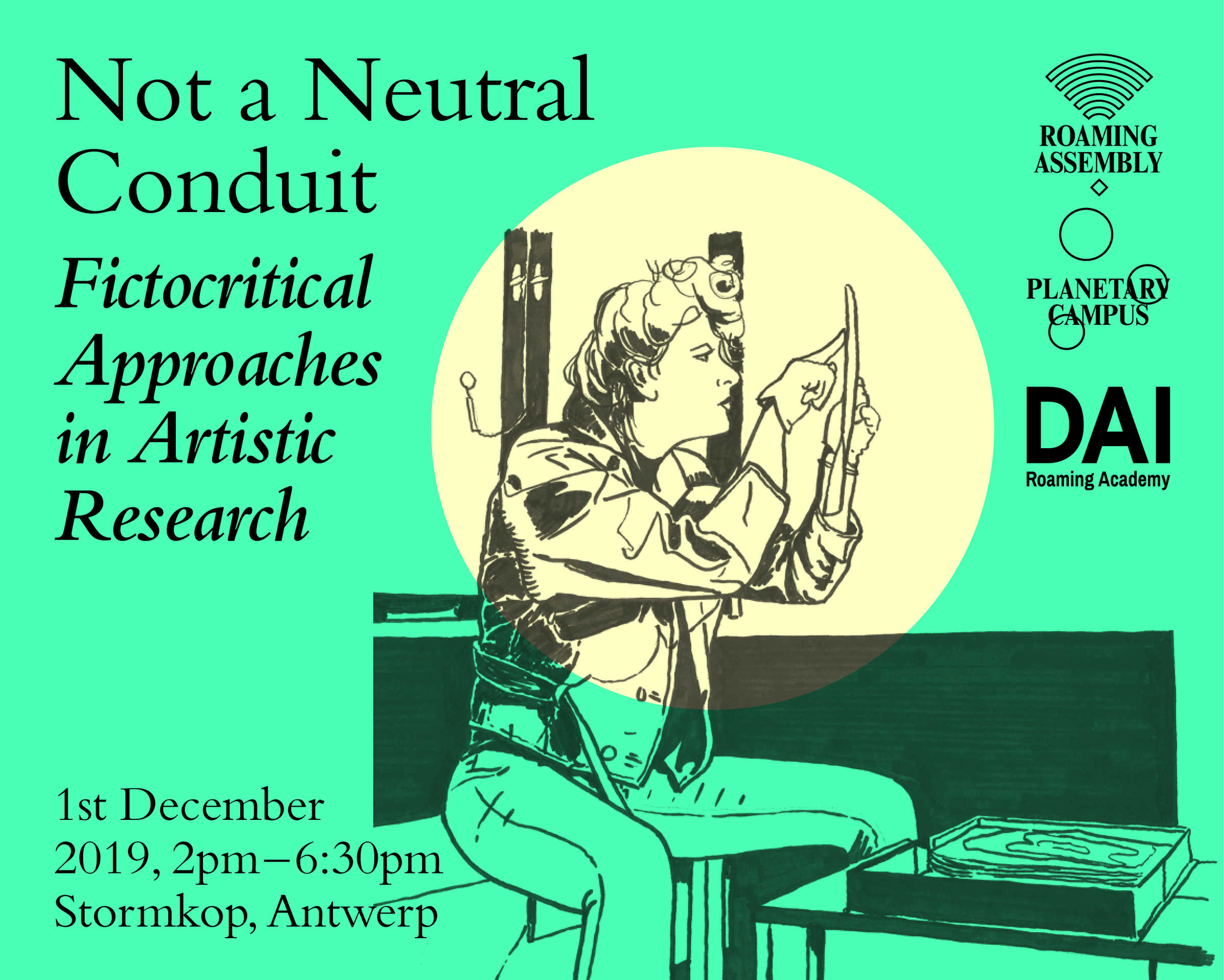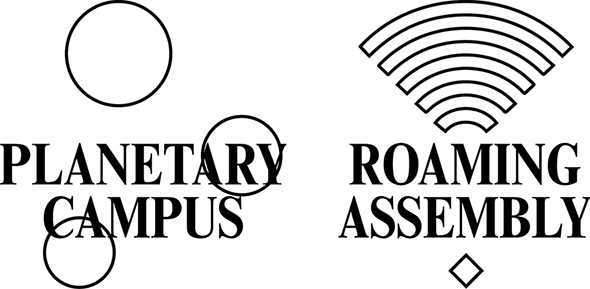2019 ~ Antwerp, Belgium: Roaming Assembly# 26 ~ Not a Neutral Conduit: Fictocritical Approaches in Artistic Research ~ convened by David Maroto
Sunday December 1, 2019
We are excited to invite you to join us at Stormkop, in the old harbour of Antwerp for our
Roaming Assembly#26
this time convened by David Maroto upon the invitation of the Dutch Art Institute (DAI) to celebrate the awarding of his PhD from the Edinburgh College of Art in partnership with us, DAI, where he previously obtained his MFA in 2013.
David will host the following guest contributors:
Beyond Fictocriticism Factory participants: Dayna Casey, Eric Peter, Hannah O’Flynn, Julian Fricker, Marc Norbert Hörler, Risa Horn, Vita Buivid, Zachary Schoenhut and Bethany Crawford, Ciaran Wood, Ciprian Burete, Dina Mohamed, Edel O’Reilly, Matthieu Blond, Nilz Källgren, Samantha McCulloch, Teresa Distelberger in abscentia.
INTRODUCTION
(Scroll for Program and Practical Information)
Carl Rhodes defines fictocriticism as ‘a writing engaged in genre-bending as a literary and theoretical engagement with existence and selfhood’. In keeping with him, fictocriticism’s multidisciplinary approach seeks to ‘blur the boundaries between the fictional, the factual, and the theoretical’. Thus, fictocriticism ‘is methodological, but it is about blurring the traditional distinctions between style and content as well. The text not being a neutral conduit of meaning is central to the method and the object of research, in that sense.’
Our time, according to Rosalind Krauss, is characterised by a post-medium condition: the model of modernity that was anchored to notions of purity has become obsolete and the boundaries between disciplines are being increasingly erased. Indeed, in recent years there has been a turn in the visual arts towards narrative literature. In this context, a growing interest in experimental forms of creative criticism is producing a hybrid textual space where theory and practice, fiction and research, merge. From this viewpoint, it could be argued that a fictocritical approach would be perfectly suited to the creative spirit that animates contemporary artistic enquiry.
What can we learn from fictocriticism? How to employ writing as a research method? What can artists and scholars gain from using creative writing tools at the service of artistic research? How to retain cognitive value through the use of fiction? Can research be performed? These questions will serve as springboards for Not a Neutral Conduit: Fictocritical Approaches in Artistic Research – a unique opportunity for salient experts in various fields (fictocriticism, artistic research, art criticism, curatorial writing) to gather around an afternoon of discussion, performance, and a sharing of innovative methodologies across disciplines.
Throughout the previous academic year, David Maroto has been working with a group of DAI students in the Factory workshop ‘Beyond Fictocriticism’. The participants organised themselves in groups and identified content areas, which they critically explored by means of fiction writing. The resulting texts have been compiled in a ‘Reader on Stage’. Fictocritical writing entails a performative element that will be presented during the Roaming Assembly. Each text in the Reader on Stage will be enacted as an ‘Interlude’ by the students/authors, punctuating the guest speakers’ interventions.
PROGRAM
14.00–16.05
Word of welcome DAI Roaming Academy
Keynote by David Maroto: Not a Neutral Conduit
Interlude I: Smelling Words and Speaking Tongues
(Dayna Casey, Marc Norbert Hörler, Teresa Distelberger)
Gerrit Haas: Artful Fictocritical Writing
While the name ‘fictocriticism’ was coined at the fringes of the 1990s’ Canadian art scene, the in-between practice it designates kept evolving at the margins of the Australian academy, where combined creative writing and literary theory units encouraged artful experimentation with speaking positions critical of generic academic writing. This brief introduction focalises key strategic features of the fictocritical.
Barbara Browning: Wann erblickt man dich? (When can one see you?)
She’d been told that some young artists wanted to ask her about fictocriticism – what it means to construct a story out of one’s research on performance. But if they were curious about her, the feeling was, of course, mutual. She decided to perform a little research, and tell a little story.
Barbara Browning in conversation with Julian Fricker, Risa Horn, and Zachary Schoenhut.
Interlude II: The Fridge
(Bethany Crawford, Dina Mohamed, Edel O’Reilly, Samantha McCulloch)
16.05–16.20
COFFEE BREAK
16.20–18.00
Interlude III: ALPHABET CITY REGIONAL BUSINESS DISTRICT: What You’ll Pay The Vibe
(Ciarán Wood, Ciprian Burete, Risa Horn)
Pablo Larios: After Network Fatigue
Pablo Larios’s presentation will correlate assessments of current art criticism and art writing alongside a consideration of works of art in an age of accelerated image circulation.
Marti Manen and David Maroto in conversation: Fictocriticism and Curatorial Strategies
The conversation will address the use of narrative fiction as a mediating device that situates the contemporary artistic experience from new curatorial con-texts. Marti and David will reflect on this question through the lens of their own practices, predicated on immersion, imagination, and identification rather than analytical distance.
Q&A with guest speakers
Interlude IV: Dot dot dot question mark exclamation mark
(Julian Fricker, Matthieu Blond, Nilz Källgren)
Interlude V: Russian Literature Better than Sex
(Eric Peter, Hanna O’Flynn, Vita Buivid, Zachary Schoenhut)
Interlude V will take place throughout the duration of the Roaming Assembly.
18.00 - 18.30
DRINKS
18.30
COMMUNAL MEAL
PRACTICAL INFORMATION
Sunday, 1 December 2019, 2.00 PM - 6.30 PM
STORMKOP
Droogdokkenweg 4, 2030 Antwerp
Admission is free ~ but please join our facebook event. ~
All lectures and talks will be in English.
If you wish to join our communal dinner at Stormkop around 18:30, please feel free to contact Nikos Doulos and make a reservation by Friday 29th of November.
Dinner costs: 10,00 euros (to be settled by cash on spot).
Planetary Campus is an innovative conceptual space (without walls) where the MA curriculum "DAI Art Praxis" meets with a wide variety of external parties. A welcoming hub where we host a fleeting, affective community, where art and research are generously shared, where complexity can be embraced and intellectual intra-actions are fostered, aiming to endow our praxes, wherever they are operational. The Planetary Campus constitutes a productive interface between academia and the world, between academic and artistic researchers, practitioners, activists, intellectuals, institutions and organisations. As an infrastructure Planetary Campus is the container for a variety of activities initiated by the DAI:
One of them is the Roaming Assembly, a recurring public symposium functioning as it were as the DAI-week's 'centerfold' event. This state-of-the-art speculative and hybrid program explores specific themes and topics of contemporary relevance to the thinking of art in the world today.
Although closely interlinked with the DAI's curriculum, Roaming Assembly editions are not conceived as plain extensions of the regular DAI classes and seminars, but rather envisioned as sovereign happenings, designed to mobilize our bodies, our intelligences.
Initiator and curator-in-chief Planetary Campus: Gabriëlle Schleijpen
Senior coordinator Planetary Campus: Nikos Doulos
Intermin coordinator Roaming Assembly : Peter Sattler
Documentation: Baha Görkem Yalim ; see our Video Archive
Communication design: Lauren Alexander & Hanna Rullmann/Foundland
If you want to receive the DAI's newsletter on a regular base (ultimately 12 x per year, never more) you are welcome to register here.


